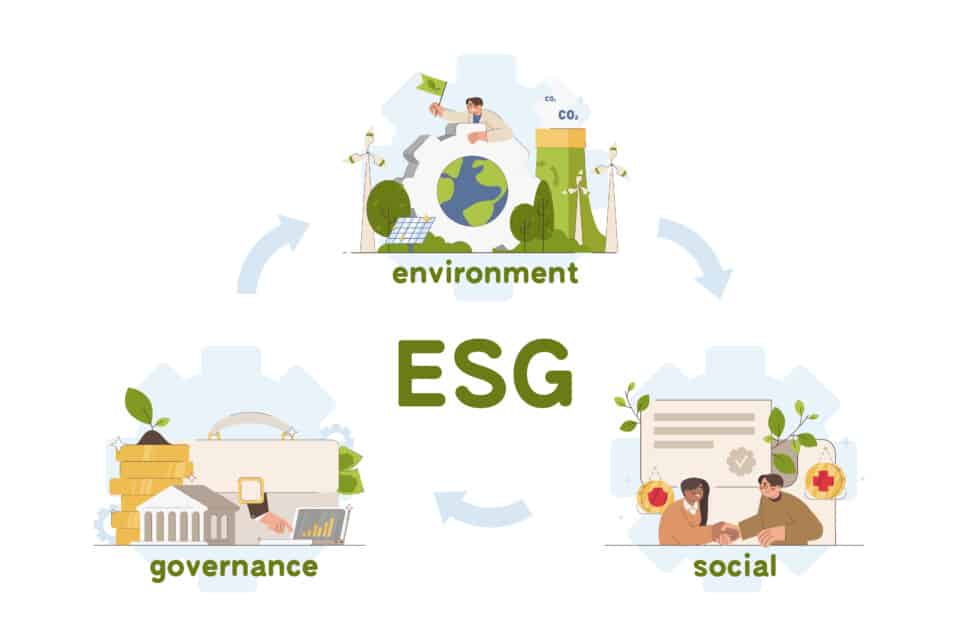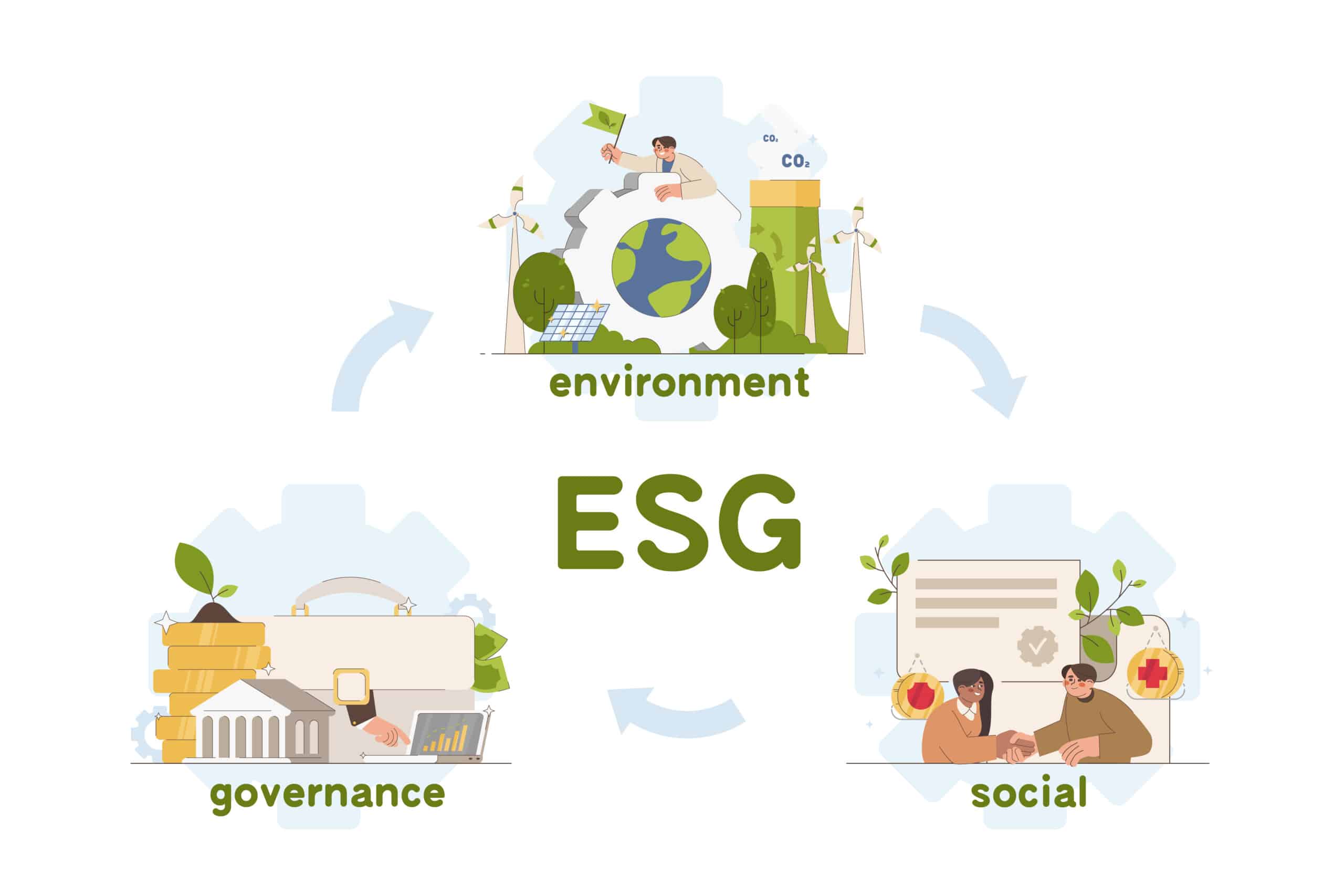ESG, or Environmental, Social, and Governance, has become an increasingly important concept in the business world. With the growing awareness of the impact that businesses have on the environment, society, and governance structures, there has been a call for organizations to take responsibility for these impacts and to work towards a more sustainable future. ESG can be described as a set of practices that organizations implement to limit negative impact or enhance positive impact on these areas. These practices can include policies, procedures, metrics, and other tools that help to measure and track progress towards sustainability goals. The adoption of ESG practices is seen as a crucial step towards creating a more responsible and sustainable business environment that benefits both society and the planet.
Simaxx’ ESG services are two distinct yet interconnected aspects of sustainability and energy management. Simaxx is a software platform designed to optimize building performance and energy efficiency. It provides real-time monitoring, analysis, and control of various systems within a building, such as HVAC, lighting, and electrical equipment, helping to reduce energy consumption and improve operational efficiency. On the other hand, ESG (Environmental, Social, and Governance) services encompass a broader set of practices and initiatives aimed at measuring and managing the environmental and social impact of organizations. This includes assessing and reporting on factors such as carbon emissions, resource consumption, social responsibility, diversity, and ethical business practices. While Simaxx focuses primarily on energy management, integrating ESG services can provide a more comprehensive sustainability approach, ensuring that organizations address a wider range of environmental and social factors to achieve long-term success and positive societal impact.

The Rise of ESG: A New Standard For Corporate Responsibility
ESG can be defined as a framework for evaluating companies based on their commitment to sustainable business practices. Environmental factors such as reducing carbon emissions, conserving natural resources, and preventing pollution are crucial aspects of a company’s ESG approach.
Social factors such as diversity, inclusion, and labor practices are also important considerations. Additionally, strong corporate governance and ethical business practices are critical components of a company’s ESG strategy. These efforts reflect a company’s commitment to long-term value creation, risk mitigation, and corporate responsibility.
The integration of Environmental, Social, and Governance factors into business practices is becoming increasingly important to investors, as it provides a more comprehensive view of a company’s overall health and sustainability.
Importance Of ESG In Today’s Business Landscape
The importance of ESG in today’s business landscape cannot be overstated. As consumers become increasingly socially conscious and demand sustainability, businesses have a responsibility to ensure that their operations do not harm the environment or communities in which they operate. Besides, investors are becoming more aware of ESG factors, and studies have shown that companies with strong ESG performance tend to outperform their peers in the long term.
Additionally, regulators are also beginning to focus more on Environmental, Social, and Governance; for instance, the EU recently introduced a Green Deal that aims to make the continent carbon-neutral by 2050. With all these developments, companies that do not pay attention to ESG factors risk being left behind and losing value in the eyes of stakeholders. ESG practices can be a valuable tool for organizations to assess and improve their impact on the environment, society, and governance bodies. By implementing ESG policies, procedures, and metrics, companies can make informed decisions that balance their need for profitability with their social responsibility.
These practices can help companies limit the negative impacts of their operations, such as green house gas emissions or unethical business practices, while also enhancing their positive impact, such as investing in renewable energy or engaging in philanthropic activities. As more investors and consumers prioritize companies with strong ESG scores, businesses that prioritize responsible practices will be better positioned to succeed in the long-run.
How Environmental Practices Impact Your Company’s ESG Score
Environmental practices refer to a range of measures that organizations take to limit negative environmental impact. Environmental practices play a significant role in determining a company’s Environmental, Social, and Governance (ESG) score.
ESG scores are used to evaluate a company’s performance and sustainability in various areas, including environmental impact. The practices may include reducing the use of non-renewable resources, minimizing waste and emissions, and adopting sustainable energy sources. Organizations may implement policies and procedures to ensure compliance with environmental regulations and standards.

In recent years, there has been an increased focus on environmental practices within the framework of Environmental, Social, and Governance. This reflects a growing recognition of the importance of a sustainable economy, and the need for businesses to play a role in promoting environmental stewardship. As such, effective environmental practices are crucial for organizations in both meeting their obligations and contributing to broader environmental goals.
Explanation Of Environmental Practices Under ESG
One of the most significant areas of ESG relates to the environment. Environmental practices under ESG aim to minimize negative impacts on the environment and increase initiatives that promote environmental sustainability. Some environmental practices include reducing greenhouse gas emissions, improving energy and resource efficiency, and reducing waste generation.
Implementing these environmental practices encourages organizations to be more mindful of their carbon footprint and contribute to a healthier planet. Moreover, environmental practices under ESG can help companies save on costs by reducing waste generation, improving energy efficiency, and cutting down on unnecessary expenses. Ultimately, effective implementation of environmental practices under ESG can have a positive impact on both the environment and an organization’s bottom line.
Importance Of These Practices In Mitigating Negative Environmental Impact
Furthermore, implementing Environmental, Social, and Governance practices can minimize the negative impact on the environment and promote sustainability. With the growing awareness of environmental issues such as climate change, deforestation, and pollution, businesses have a responsibility to limit their contribution to these problems. Implementing sustainable practices such as reducing waste, using renewable energy sources, and employing environmentally friendly technologies can lessen a firm’s ecological footprint.
Companies that implement Environmental, Social, and Governance practices practices are not only more environmentally conscious but also more attractive to environmentally conscious consumers. As such, the adoption of Environmental, Social, and Governance practices can help organizations reduce their negative impact on the environment and enhance their reputation by demonstrating their commitment towards social and environmental responsibility.
Social Practices And ESG: The Power of Corporate Responsibility

The third key aspect of Environmental, Social, and Governance practices is social practices, which focus on how businesses interact with society and the communities in which they operate.
This includes everything from labor standards and human rights to community development and philanthropy. Socially responsible organizations strive to build strong relationships with communities, prioritize diversity and inclusion efforts, and foster a culture of ethical behavior throughout their workforce.
By embracing social practices, companies can build trust with stakeholders, enhance their reputation, and attract a loyal customer base that values sustainability and social responsibility.
In short, social practices are essential for businesses that seek to operate in a responsible and sustainable manner, and contribute positively to creating a better world for all.
Explanation Of Social Practices Under ESG
Social practices under Environmental, Social, and Governance practices refer to the policies and procedures implemented by organizations to ensure that any negative impact on society is minimized, and positive impacts are maximized. These practices advocate for companies to prioritize ethical and responsible behavior towards the society in which they operate.
Companies must ensure that they treat all stakeholders, including employees, customers, suppliers, and local communities, with utmost respect and fairness. These practices also require companies to be transparent about their operations and the impact they have on society. By adopting these social practices, companies not only enhance their reputation but also contribute towards building a more sustainable and equitable society.
Importance Of These Practices In Enhancing Positive Impact On Society
The implementation of ESG practices in corporate organizations is crucial in enhancing positive impact on society. Such practices include incorporating environmental concerns, social responsibility, and ethical governance in decision-making processes. Organizations that adopt effective ESG practices are more likely to have positive social and environmental impact, thereby promoting sustainable development. These practices also help organizations to build stronger relationships with stakeholders, including customers, suppliers, employees, and investors, who increasingly demand for socially responsible investments.
In the long run, the integration of Environmental, Social, and Governance practices practices in organizational culture can lead to enhanced reputation, trust, and legitimacy, which are essential for long-term survival in the highly competitive corporate world. Therefore, it is essential for corporate organizations to adopt and implement effective ESG practices to enhance their contribution to society and to remain financially sustainable.
How Governance Practices Drive ESG Performance
Governance practices are a vital component of ESG, as they refer to the internal and external mechanisms that organizations put in place to ensure accountability, transparency and ethical behavior in their operations.
This includes the composition and functions of the board of directors, executive compensation structures, risk management policies, stakeholder engagement strategies, and regulatory compliance frameworks.
Effective governance practices enable organizations to make better decisions that balance short-term financial objectives with long-term sustainability goals, foster stakeholder trust and loyalty, and mitigate reputational risks.
In addition, they can help organizations to attract and retain talent, access capital more easily, and achieve competitive advantage in increasingly crowded markets. Therefore, governance practices should be a key focus for companies that are committed to delivering sustainable value to all stakeholders.

Explanation Of Governance Practices Under ESG
Governance practices under ESG refer to the set of policies, procedures, and metrics that companies implement to maintain responsible and accountable business practices. Good governance practices are essential for promoting transparency, ethical behavior, and social and environmental stewardship.
Under ESG, companies are expected to conduct business in a manner that considers the interest of stakeholders, including shareholders, employees, customers, and the overall community. These practices also involve assessment and management of the risks associated with a company’s operations.
For instance, companies will need to address issues such as board composition, executive pay, and stakeholder engagement to ensure that governance structures support the organization’s values. Overall, ESG governance practices provide a framework for companies to operate responsibly and sustainably.
Importance Of Governance Practices In Building Trust With Stakeholders
Governance practices are critical for building trust with stakeholders. Governance ensures that organizations are transparent, accountable, and responsible in their decision-making processes. It also helps to ensure that organizations adhere to ethical standards and comply with regulatory requirements. Through governance practices, organizations can demonstrate their commitment to sustainable and socially responsible practices.
By implementing governance policies and procedures, organizations can ensure that their stakeholders have a clear understanding of the company’s operations, strategy, and performance. This transparency builds trust among stakeholders, including shareholders, employees, customers, and the broader community. Additionally, effective governance practices can lead to improved financial performance, enhanced reputation, and reduced risk.
Strong governance practices are essential for promoting a company’s long-term sustainability and creating positive social and environmental impact. The implementation of ESG practices has become increasingly important for organizations in today’s society. With a heightened awareness of environmental and social issues, consumers are beginning to demand that companies take responsibility for their impact on the world.
ESG practices are a way for organizations to take action in limiting their negative impact and enhancing their positive impact on the environment, society, and governance bodies. These practices can involve policies and procedures aimed at reducing the organization’s carbon footprint, promoting diversity and inclusion, and ensuring ethical governance. By implementing ESG practices, organizations can not only meet the demands of their stakeholders but also contribute to the greater good of society as a whole.
The Business Case For ESG
The business case for ESG has become increasingly clear as companies recognize the economic benefits of implementing sustainable practices. A commitment to ESG can lead to reduced operational costs, improved brand reputation, and increased employee and shareholder satisfaction. In addition, ESG factors can provide valuable insights into a company’s long-term financial performance, helping investors make more informed decisions.
By prioritizing sustainability and social responsibility, companies can attract and retain customers who value ethical business practices and contribute to a more resilient and equitable global economy. With ESG considerations playing an increasingly important role in corporate decision-making, companies that fail to prioritize sustainability risk falling behind their competitors.
Benefits Of ESG To Organizations
There are several benefits of implementing ESG practices within organizations. Firstly, such practices can improve corporate reputation and can lead to increased customer loyalty and investor confidence. Moreover, businesses that are committed to sustainability are likely to attract and retain top talent, which can enhance their overall productivity and profitability. ESG practices can also drive innovation and help organizations identify new markets and business opportunities.
Additionally, by prioritizing responsible governance, organizations can mitigate risks and improve long-term financial stability. Finally, ESG practices can help organizations build stronger relationships with local communities and governments, which can be instrumental in achieving long-term success. Overall, ESG practices can help firms align their operations with social and environmental values, while also generating tangible economic benefits.
ESG, or Environmental, Social, and Governance, strategies are becoming an increasingly popular approach across a wide range of industries. These strategies encompass a set of practices, policies, and metrics that are specifically designed to limit the negative impact of businesses on the environment, society, and governance structures.
By implementing ESG strategies, organizations can ensure that they are contributing positively to the greater good, while also ensuring that they are minimizing their negative impact on a wide range of key issues. This includes areas such as climate change, social inequality, diversity and inclusion, and ethical business practices. Ultimately, the application of ESG strategies has the potential to profoundly reshape the way that businesses are perceived, and to create a more sustainable and equitable future for all.
Challenges In Implementing ESG Practices
Despite the benefits of ESG practices, implementing them can pose significant challenges for many businesses. One key obstacle is the lack of uniformity and standardization in ESG reporting and assessment. This makes it difficult for companies to compare their performance to other businesses and to determine whether they are meeting industry standards.
Furthermore, ESG practices often require significant investments of time, money, and resources, which can be difficult for companies with limited financial means. Another challenge is the perceived trade-offs between ESG practices and profitability. Skeptic argue that prioritizing environmental and social values can result in slower growth and lower returns, while proponents maintain that adherence to ESG practices can boost shareholder value by mitigating risks and enhancing reputation. Ultimately, successful implementation of ESG practices requires a thoughtful and strategic approach that balances social responsibility with financial sustainability.

Challenges Faced By Companies In Implementing ESG Practices
There are several challenges that companies face when implementing ESG practices. One of the most significant challenges is the cost of implementation, which can be substantial and may require a significant investment of time and resources. Additionally, companies often struggle to assess their progress and measure the impact of their ESG initiatives accurately. This can be especially challenging for smaller businesses, which may lack the resources and expertise to develop and implement ESG practices effectively. Furthermore, there is often a lack of cohesive regulation or standardization around ESG practices, creating uncertainty and confusion for companies seeking to implement them. These challenges pose significant obstacles to widespread adoption of ESG practices, but they are nonetheless critical for companies concerned with their impact on the environment, society, and governance.
Strategies For Overcoming These Challenges
To overcome the challenges associated with implementing effective ESG strategies, organizations must take a multifaceted approach. Initially, they should adopt an innovative, proactive mindset, and establish clear, measurable sustainability goals that align with their corporate objectives. This approach requires the commitment of top management, effective communication with stakeholders, and regular monitoring of progress. Companies must invest in technology and employees’ skill-building to implement ESG practices effectively.
Technology, for instance, can automate data collection and analyzer processes to generate accurate ESG metrics. On the other hand, employee training programs can familiarize workers with ESG guidelines and practices, making them active ESG champions in their respective organizations. The success of any ESG strategy depends on adequate education, collaboration, and recognition of the organizational benefits of ESG practices.
How Does Simaxx Enhance ESG Services For Organizations?
By integrating cutting-edge technologies and data-driven insights, Simaxx Analytics empowers organizations to create sustainable and occupant-centric environments while ensuring regulatory compliance. To improve occupant comfort and wellbeing, Simaxx leverages sensor integration and real-time monitoring capabilities. By seamlessly integrating with IoT devices and sensors, the platform continuously collects data on indoor environmental parameters such as temperature, humidity, air quality, and lighting.
Through sophisticated analytics, organizations gain actionable insights into areas that require attention to optimize comfort levels. Facility managers receive instant feedback and can promptly address any issues, enhancing the overall experience and productivity of occupants. Furthermore, Simaxx provides personalized recommendations based on occupant data and preferences, enabling organizations to tailor the indoor environment to individual needs, fostering a sense of wellbeing.
Compliance monitoring is a critical aspect of ESG practices, and Simaxx Analytics excels in this domain. The platform offers comprehensive regulatory analysis, ensuring organizations stay informed about evolving ESG requirements and standards. This helps organizations demonstrate transparency and accountability, instilling trust among stakeholders.
Stakeholder Engagement
We can facilitate effective stakeholder engagement by providing data-driven insights into stakeholder preferences, concerns, and expectations regarding ESG performance. This helps organizations understand and address stakeholder needs, enhance transparency, and foster stronger relationships with customers, employees, investors, communities, and other stakeholders.
Simaxx can bring data-driven decision-making, analytical expertise, and technological capabilities to support organizations in implementing and improving their ESG practices. By leveraging data analytics, you can better understand the environmental impact, social responsibility, and governance effectiveness, leading to more sustainable and responsible business operations.
Performance Monitoring And Reporting
Simaxx can help organizations establish robust performance monitoring systems to track their progress towards ESG goals. This involves developing key performance indicators (KPIs), dashboards, and reporting frameworks that provide real-time visibility into ESG metrics and performance.
Through automated data aggregation, analysis, and visualization, the company can facilitate accurate and timely reporting on ESG performance, enabling organizations to demonstrate transparency and accountability to stakeholders, investors, and regulatory bodies.
Risk Assessment And Mitigation
Simaxx can assist in identifying and assessing risks associated with ESG factors. By analyzing relevant data and patterns, we can help organizations identify potential risks, such as environmental hazards, social controversies, or governance deficiencies.
By conducting risk assessments we can support organizations in developing proactive strategies to mitigate risks and strengthen ESG practices, ensuring long-term sustainability and resilience.
Strategy And Goal Setting With Simaxx

We provide valuable insights to inform the development of ESG strategies and goal setting. By analyzing industry trends, benchmarking against peers, and conducting impact assessments, we can help organizations identify areas of improvement and set realistic and measurable ESG goals aligned with their overall business objectives.
Simaxx also empowers organizations to monitor and improve their overall ESG performance. By tracking key metrics aligned with industry standards, such as energy efficiency, greenhouse gas emissions, waste reduction, and social impact, organizations can assess their sustainability efforts.
The platform offers customizable dashboards and visualizations, providing a clear overview of ESG performance. Simaxx facilitates benchmarking against industry peers, enabling organizations to identify areas for improvement and set realistic targets for enhancing their ESG practices. This comprehensive analysis ensures organizations maintain a competitive edge and continuously evolve their sustainability initiatives.
Simaxx is at the forefront of revolutionizing occupant comfort, wellbeing, and compliance monitoring in the context of ESG practices. By leveraging advanced analytics, sensor integration, and real-time monitoring capabilities, Simaxx Analytics enables organizations to create sustainable environments that prioritize occupant needs.

